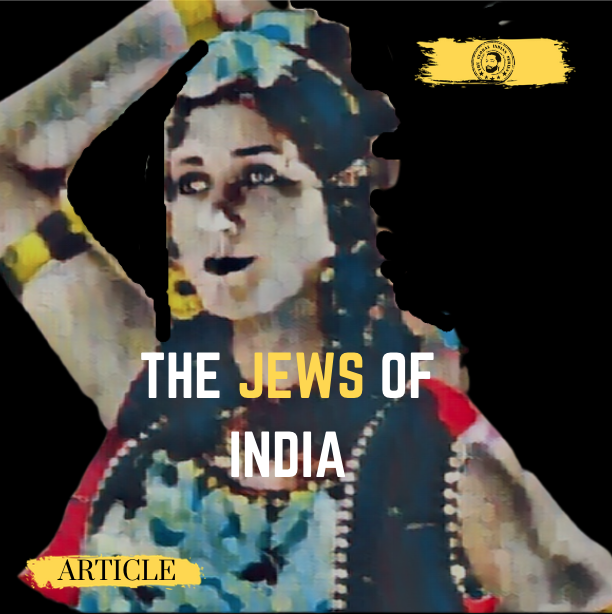There are a mere 4, 500 Jews in India in a population of 1.5. billion. Talk about minorities! What they may lack in numbers, they have made up for in other ways-cultural, political and financial.
From the Babylonian Captivity to the present, the experience of the Jews has been one of sorrow. By contrast, that of the Jews of India has been one of tolerance. Why this should be so is unclear.
It might something to do with the fact that there are very few of them. Even at its highest in the 1940s when their number 20 000 in the 1940s, they have always been far and few. Their numbers have been in decline in large part to emigration to Israel after 1948. Perhaps it is something to do with the skill with which they have assimilated through the ages. Whatever the reason, the fact remains the Jews of India have met with very little anti-Semitism. Would that this were the case in Europe.
https://www.refworld.org/docid/49749d1246.html
" Jewish Indian identity has been some 2000 years in the making"
Jewish Indian identity has been some 2000 years in the making. Jews have lived in Indian since antiquity. The story of the Jews in India is the story of three communities.
It should be pointed out at the outlet that they do not form one homogenous group but instead fall into three distinct groups, each of which has its own history:
• The Bene Israel
• The Jews of Cochin
• And the Baghdadi Jews
It is perhaps a testament to the hospitality of Indians that the tiny Jewish tiny community have been treated with kindness, for the most part.
The Bene Israel
Of the three groups, the largest is that of The Bene Israel, who dwelt in Maharashtra State. They spoke Marathi and were well integrated. Indeed, they remained isolated from other Jewish communities in India and beyond until the 19th and 20th Century. By trade, Most Bene Israel became pressers of sesame oil. To begin with, although they observed many Jewish customs such as Jewish holidays, circumcision and keeping the Sabbath, they had neither Torah scrolls nor synagogues.
Their origins are obscured by the mists of time. One legend has it that they were the sole survivors of a shipwreck off the Konkan coast, some thirty miles south of Mumbai. Dating their arrival involves a good deal of guesswork and is fraught with difficulty. The consensus is that entered they Indian anywhere between the 8th century B.C. to the 6th Century A.D.
The Jews of Cochin
And so to the Jews of Cochin, who settled on the tropical Malabar Coast in South West India. In the 1950s, the numbers peaked at some 2, 500 during the 1950s. The oldest of India’s Jewish population, their origins remain something of a mystery. What brought them thither is a matter of debate. It may have been spices for which Kerala is famous. Syrian Christians, Hews, Persians all came to its coconut-fringed tropical shores as merchants.
It may be they have lived on the Sub-Continent for the better part of two millennia.
According to one records, they came on the ships of King Solomon, others that they became during the Babylonian Exile; still others that they fled to Indian after the destruction of the second temple. One story tells how a group descended from he Babylonia exile sailed to Calicut via Yemen. All this is rather nebulous. The first documentary evidence of the their presence comes c. 1000 B.C. when he ruler of Cranganore gave certain Joseph Rabban (a Jewish leader) a set of engraved copper plates by way of a gift. These plates can still be seen today in the Cochin (Kerala) Paradesi synagogue.
Their number swelled in the 16th Century when they were joined by newcomers, many of them Sephardic Jews who had fled Spain and Portugal. During British colonial rule, many Kerala Jews took up positions in the ever-expanding civil service as clerks, teachers and lawyers.
Most of the Kerala Jews decided to emigrate to the newly formed Israel in 1948. The decision was a difficult one, for they had been treated well by India for some 2000 years and had been spared the horrors of the Holocaust and the pogroms of Europe. Many of them settled on cooperative farms, where many of their descendants remain to this day.
The Baghdadi Jews
Lastly come the Baghdadi Jews. As the name suggests they hail or very possibly hailed from Baghdad and Syria. Arriving in India in the 18th Century, they settled in the great cities of Western and eastern India. They were quick to adapt to life under the British Raj, so much so that they severed most of their links with Baghdad and indeed their brethren elsewhere in India. Some elected to stay and would be absorbed into the caste system.
The East India Company made Basra as trading centre in 1760 and from Basra and indeed Baghdad after which they are named that that the Baghdadi Jews came. There they played an important role in commerce and therefore it seemed logical to move closer to the centre of the nascent British Empire in India. ‘Baghdadi’ is something of something of an umbrella word, for many of these Jews hailed from Syria and other parts of the Ottoman Empire. Much encouraged by the East India Company and prominent Iraqi families, they prospered as merchants and middlemen for the cotton, jute and tobacco plants.
Many Baghdadi Jews played a leading part in pubic affairs. In Calcutta many were appointed magistrates and many of the powerful merchants were invited to the viceroy’s Durbars.
The Sassoons: "The Rothschilds of the East"
The wealthiest Baghdadis adopted Western clothing, whilst poor Baghdadis continued to wear their traditional Arabic clothes. Of the most distinguished Baghdadi Jews, one name stands above all others: that of man if affairs Shaikh David Sassoon (1792-1864) who arrived in Bombay in 1828 and soon perhaps a fabulously wealthy merchant and much respected member of the community. It was he who in 1861 built the Magen David synagogue in Mumbai. The synagogue contained a hostel for travellers, a ritual bath and a Talmud Torah school. His business empire coupled with his great reputation for philanthropy earned the Sassoons the title “the Rothschilds of the East."
So there you have it-the Jewish community of India. Small, but anything but insignificant.
If you found this interesting, do have a look at the rest of The Global Indian History Season:
The Roma, one of the Lost Tribes of India
HISTORY OF INDIANNESS | IRAN – DEEP DIVE INTO RELIGION
HISTORY OF INDIANNESS | THE CASTE SYSTEM AND URDU
-------------------------------










